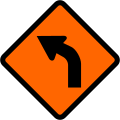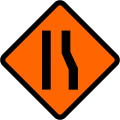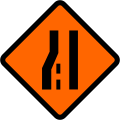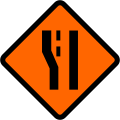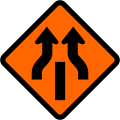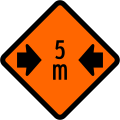Road signs in Indonesia

Road signs in Indonesia are standardized road signs similar to those used in other nations but with certain distinctions. As a former Dutch colony, until the 1970s road signs in Indonesia closely followed The Netherlands rules on road signs. Nowadays, Indonesian road sign design are a mix of European, US MUTCD, Australia, New Zealand and Japanese road sign features. According to the 2014 Minister of Transport's Regulation No. 13 concerning Traffic Signs,[1] the official typeface for road signs in Indonesia is Clearview. Indonesia formerly used FHWA Series fonts (Highway Gothic) as the designated typeface though the rules are not being implemented properly.
Indonesian road signs use Indonesian, the official and the national language of Indonesia. However, English is also used for important public places such as tourist attractions and airports. Bilingual signs can be found in tourist areas such as Bali.
Indonesia signed the 1968 Vienna Convention on Road Signs and Signals but have yet to ratify the Convention.[2] Indonesia drives on the left.
Warning signs
[edit]Warning signs warn of possible dangers or unusual conditions ahead and alert motorists on the hazards to expect. Warning signs in Indonesia used to closely follow US MUTCD and Japanese warnings signs: a diamond-shaped with yellow background and black-and-yellow outline. Though they recently changed it to be a full black outline.
-
Railway Crossing (No gates)
-
Railway Crossing (With gates)
-
Bend
-
Double bend
-
Sharp bend
-
Double sharp bend
-
Two Bend
-
Degree loop
-
Road narrows
-
Road narrows on right
-
Narrow bridge
-
Steep descent
-
Hazardous descent
-
Steep climb
-
Hazardous climb
-
Slippery road
-
Dip
-
Speed bump/hump
-
Uneven road
-
Loose gravel
-
Falling rocks
-
Traffic lights ahead
-
Roundabout Ahead
-
Divided Road
-
Divided road ends
-
Roadway splits
-
Pedestrian crossing
-
Pedestrian traffic
-
School crossing
-
Bicycle zone
-
Cattle crossing
-
Deer crossing
-
Other hazards
-
Roadworks ahead
-
Max height limit
-
Max width limit
-
Low flying-aircraft
-
Crosswinds
-
Two way-traffic
-
Drawbridge
Intersections
[edit]-
Crossroad
-
Priority road
-
Skewed crossroad
-
Merging to left
-
Merging to right
-
Crossroad to left
-
Crossroad to right
-
Double crossroad to left
-
Double crossroad to right
-
Exit crossroad
-
Priority side road
-
T crossroad
-
Y crossroad
Regulatory signs
[edit]Prohibitory signs
[edit]Prohibitory signs in Indonesia are circular in shape and have a red border with diagonal bars except for Stop, Give Way, and Railroad Crossing signs.
-
Stop
-
Give way
-
Customs
-
Toll gates
-
One-track railroad crossing
-
Multi-track railroad crossing
-
No entry
-
No motorcycles and mopeds
-
No overtaking
-
No cars
-
No vehicles (combination)
-
No bicycles
-
Maximum length for motorized vehicles
-
Maximum height limit
-
Maximum width limit
-
Maximum weight limit
-
Maximum weight limit per axel
-
No stopping
-
No parking
-
No left turn
-
No U-turn
-
No right turn or U-turn
-
Minimum distance between cars
-
Maximum speed limit in kilometers per hour (km/h)
-
Give way to oncoming vehicles
-
End of speed restriction limit
Mandatory signs
[edit]Mandatory signs in Indonesia follows the "Type A Mandatory Signs" as prescribed by the Vienna Convention, which is the European-style white-on-blue circular signs with addition of a white border.
-
Keep left
-
Keep right
-
Turn left
-
Turn right
-
Go straight/one way
-
Roundabout
-
Straight ahead or left turn primited
-
Straight ahead or right turn primited
-
Keep left
-
Keep right
-
Pass either side
-
Minimum speed limit in kilometres per hour (km/h)
-
Tyre chain
-
Motorcycles lane
-
Bus-only lane
-
Truck-only lane
-
Pedestrians only
-
Equestrians only
-
Bicycles only
-
Rickshaws only
-
Carts only
-
Horse carriage only
-
Non-motorized vehicles only
-
End of minimum speed limit
-
End of tyre chain usage
Directional signs
[edit]-
4-way directional sign. Ngurah Rai International Airport is highlighted in blue as it is a public facility
-
3-way directional sign. Note the Indonesian National Highway number hexagon
-
Exit to toll road
-
National route distance sign (differs by island)
-
Entrance to toll road
-
3-way directional sign. Kawasan Kota Tua, a tourist attraction, is highlighted in brown
-
4-way intersection directional sign. TOL PURBALEUNYI, a motorway, is highlighted in white and bears the international highway symbol, while Stasiun KA Kota, a train station, is highlighted in blue.
Toll Road signs
[edit]Most of the signs in this section are custom-made by the toll road operator and unavailable in the current regulations.
-
Indonesian Toll Road Symbol
-
Toll road name begins
-
Toll road name ends
-
Highway restrictions for non-motorised vehicles ("Toll road is only for motorised vehicles with four or more wheels")
-
Toll gates ahead
-
Exit ahead (1 km)
-
Exit ahead (500 m)
-
Exit ahead (300 m)
-
Exit sign (butterfly gantry sign placed in between ramp)
-
Interchange ahead (1 km)
-
Interchange ahead (500m)
-
Interchange ahead (300m)
-
Interchange exit
-
Highway distance sign
-
Highway location marker
-
Highway location marker with meters, placed in each 200 m of the Motorway
-
Rest area ahead (1 km)
-
Rest area ahead (500 m)
-
Rest area ahead (~300 m)
-
Bridge name
-
Runaway ramp. The 500m distance is omitted in 300m before the ramp
-
Lane directory
-
Advisory sign (Right lane for overtaking only)
-
Prohibition sign (Overtaking from left is prohibited)
-
Distance guidance ahead [3]
-
Distance guidance (0m-initial position) [3]
-
Distance guidance (50m-unsafe distance) [3]
-
Distance guidance (100m-safe distance) [3]
-
Toll gates (pay toll before using the non-cash method since October 31, 2017 this sign is no longer there)
-
Toll gates (take ticket)
-
Toll gates (electronic payment has started using non-cash since 2017 by attaching a card)
-
Toll gates height limit [4] (might be omitted in some toll gates)
-
Warning sign (Fog)
-
Warning sign (Crosswind)
Information signs
[edit]-
City limits
-
End of city limits
-
Bus terminal
-
Train station
-
Harbor
-
Airport
-
Garbage/Waste disposal
-
Landfill
-
Post office
-
Telephone
-
Bus stop
-
Taxi stand
-
Transit stop
-
Crosswalk
-
Parking
-
Disabled parking area
-
Tunnel Ahead
-
End of tunnel
-
Tsunami evacuation route
-
Earthquake evacuation route
-
Volcano eruption evacuation route
-
Emergency muster zone
-
Refuge camp
-
Refuge centre
-
Mosque
-
Church
-
Vihara
-
Hindu temple
-
Hospital
-
Clinic, Community Health Centre
-
Pharmacy
-
Petrol station
-
Scheduled service station
-
Emission service station
-
Weight station
-
Museum
-
Supermarket
-
Restaurant
-
Cafe
-
Hotel
-
Motor services
-
Park
-
Border Country Ahead
-
Tent camp
-
Caravan camp
-
Camp
-
Villa
-
Beach
-
Open sports field
-
Indoor sports centre
-
Swimming pool
-
Stadium
-
School
-
Library
-
One way traffic
-
Dead end traffic
-
U-turn traffic
-
Non toll road
Temporary signs
[edit]Temporary signs generally follow New Zealand designs, albeit with the Clearview typeface instead of the Highway Gothic typeface.
-
Curve left
-
Curve right
-
Road narrows
-
Road widens
-
Narrow left
-
Narrow right
-
Widen left
-
Widen right
-
Lane ends on left
-
Lane ends on right
-
Added lane on left
-
Added lane on right
-
Construction bridges
-
Slippery road
-
Uneven road shoulders
-
Loose gravel
-
Diversion to the right
-
Diversion to the left
-
Diversion to the right ends
-
Diversion to the left ends
-
Construction Double Arrow
-
Roads Merge
-
Divided vehicle (two-way)
-
Divided vehicle ends (two-way)
-
Other danger
-
Road workers
-
Maximum height
-
Maximum width
-
Two-way
-
Roadwork traffic controllers
-
Worded warning sign (in this case "Road Work")
Electronic signs
[edit]See also
[edit]References
[edit]- ^ "Permenhub Nomor 13 Tahun 2014" [Ministry of Transport Regulation No. 13 Year 2014] (PDF). Andalalin DKI Jakarta (in Indonesian). 2014. Retrieved 2024-04-14.
- ^ "United Nations Treaty Collection". treaties.un.org. Retrieved 2023-11-18.
- ^ a b c d Only found in the Jagorawi and the Jakarta-Serpong Motorway
- ^ Indonesian vehicle maximum height standard, according to Article 54, Paragraph (1)c of the Indonesian Republic Government Regulation No. 55 of 2012 (shown in regulations as in millimetres, and height should not exceed 1.7 times vehicle breadth)


















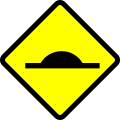






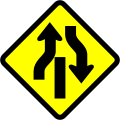
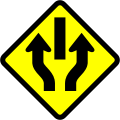










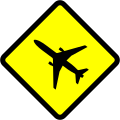


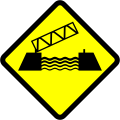



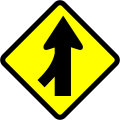
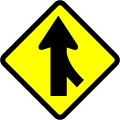
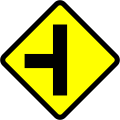


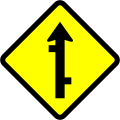

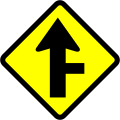

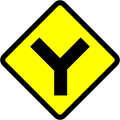



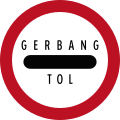



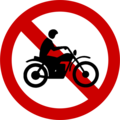




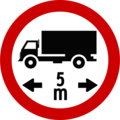
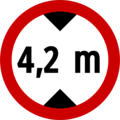



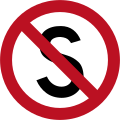



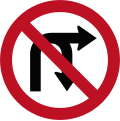

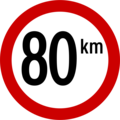



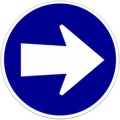
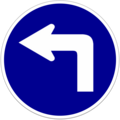
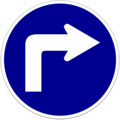

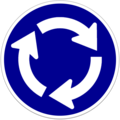


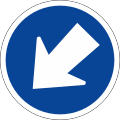
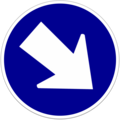

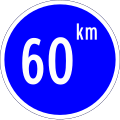
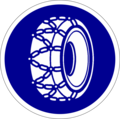



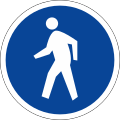




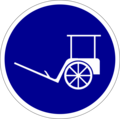










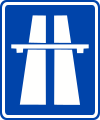













![Distance guidance (0m-initial position) [3]](http://upload.wikimedia.org/wikipedia/commons/thumb/1/1d/Indonesia_Road_Sign_Toll_Road_distance_guidance_1.png/120px-Indonesia_Road_Sign_Toll_Road_distance_guidance_1.png)
![Distance guidance (50m-unsafe distance) [3]](http://upload.wikimedia.org/wikipedia/commons/thumb/0/08/Indonesia_Road_Sign_Toll_Road_distance_guidance_2.png/120px-Indonesia_Road_Sign_Toll_Road_distance_guidance_2.png)
![Distance guidance (100m-safe distance) [3]](http://upload.wikimedia.org/wikipedia/commons/thumb/1/1c/Indonesia_Road_Sign_Toll_Road_distance_guidance_3.png/120px-Indonesia_Road_Sign_Toll_Road_distance_guidance_3.png)






























































